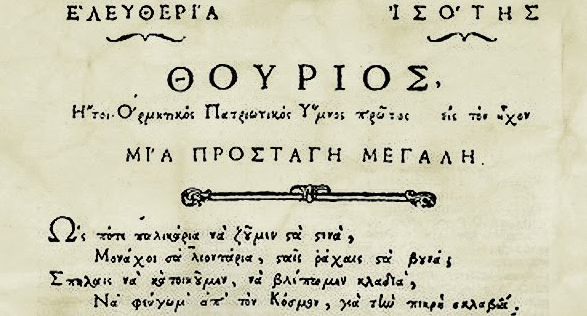
Stories Talk | Presentation Skills and Effective Storytelling
Stories Talk | Presentation Skills and Effective Storytelling
By Mia Kollia
Translated by Alexandros Theodoropoulos
Forerunner and pioneer of the Modern Greek Enlightenment, writer, politician, thinker and revolutionary, his real name, Antonios Kyriazis, has been deleted as unhistorical from the history books of the 6th grade of primary school. His first name was Rigas and according to the scholars of his time he used as his surname the name of his birthplace, Velestino in the Greek county of Magnesia. "Feraios" is a creation of later scholars, because in ancient times his village was called Ferai.
A Citizen of the World
Rigas Velestinlis was born in 1757. He studied at the School of Zagora, Pelion and was interested in ancient writers. At the age of twenty he went to Constantinople, where he learned foreign languages and boosted his knowledge close to the Phanariots, while in 1788 he settled in Wallachia as a civil servant.
In the years that followed, he was distinguished as a scholar and writer. In 1790 and 1796 he travelled to Vienna to print his books. His leading work is considered to be the "New Political Administration of the inhabitants of Roumeli, Asia Minor, the Mediterranean Islands and Wallachia", which contained the following four texts: the revolutionary song "Thourios", a revolutionary proclamation, the proclamation of human rights according to the standards of the French Enlightenment and the Riga Constitution.
Influenced by the European Enlightenment, Rigas Velestinlis deeply believed in the need for Greeks to come into contact with the new ideas that swept Europe at the time and this led him to write and translate books into vernacular language and to create a great for the time “Map” with big dimensions, consisting of individual sections.
"Until when, brave lads, must we live in the narrow passes"?
With no doubt, Thourios is the work that praised Rigas Velestinlis. It is a patriotic war hymn that he wrote in 1797 and sang himself in gatherings, in order to incite the Greeks to act against the Ottoman Empire.
Until when, brave lads, must we live in the narrow passes?
Alone, like lions, upon the mountain ridges?
Better a single hour of a life that is free,
Than fourty years of slavery and prison!
A metrical text with many narrative elements, Thourios aspired to spread the meaning of Human Law. Velestinlis deliberately chose the title Thourios, which in ancient Greek means ardent, raging and warlike, in order to determine the mental disposition that he sought to cultivate in the enslaved Greeks.

The Visionary
Rigas envisioned a "free and democratic Greece", which would treat all citizens of the Ottoman Empire as equal and fraternal, free from religious passions and historical divisions that separated them. He thought that the Greek people and all the enslaved peoples who would shake off the yoke of the Sultan, had to organise and establish their free democratic state. That was his great core thought and that’s what he was preparing.
Rigas Velestinlis' political goal was to get in touch with Napoleon, who was in Italy at the time, to persuade him to turn his attention to the Balkan regions of the Ottoman Empire. In order to open a channel of communication, he sent the emperor a symbolic gift: a cigarette case made of laurel wood that was found in the ruins of the temple of Apollo, in Tempi, Thessaly.
According to a story, Napoleon was moved by his gift and invited him to Venice. Then, Rigas went to Trieste, determined to go to Italy and meet him. However, he first sent all his legally and illegally printed books to merchant Antonios Koronios, who was a member of the patriotic company and lived in Trieste. However, Koronios wasn’t there and the books were received by his partner Dimitrios Oikonomou, who handed them over to the Austrian authorities.
The Unfair End
When Rigas arrived in Trieste and was preparing to meet the French consul, he was arrested by Austrian police. It was December 19, 1797. He was held there for about two months, and in February of the following year he was sent to Vienna, where he was imprisoned along with other members of the patriotic company.
In early May 1798, Rigas was handed over, along with some of his comrades, as Turkish nationals, to the Pasha of Belgrade, who was ordered to transport them to Constantinople.
However, information that reached Belgrade stated that there would be an attack to free Rigas Feraios and so the Pasha of Belgrade decided to kill the detainees on the spot. The execution took place in the basement of the Neboisa tower, where Rigas and his comrades were held captive, on the night of June 12, 1798, and their bodies were dumped on the Danube.